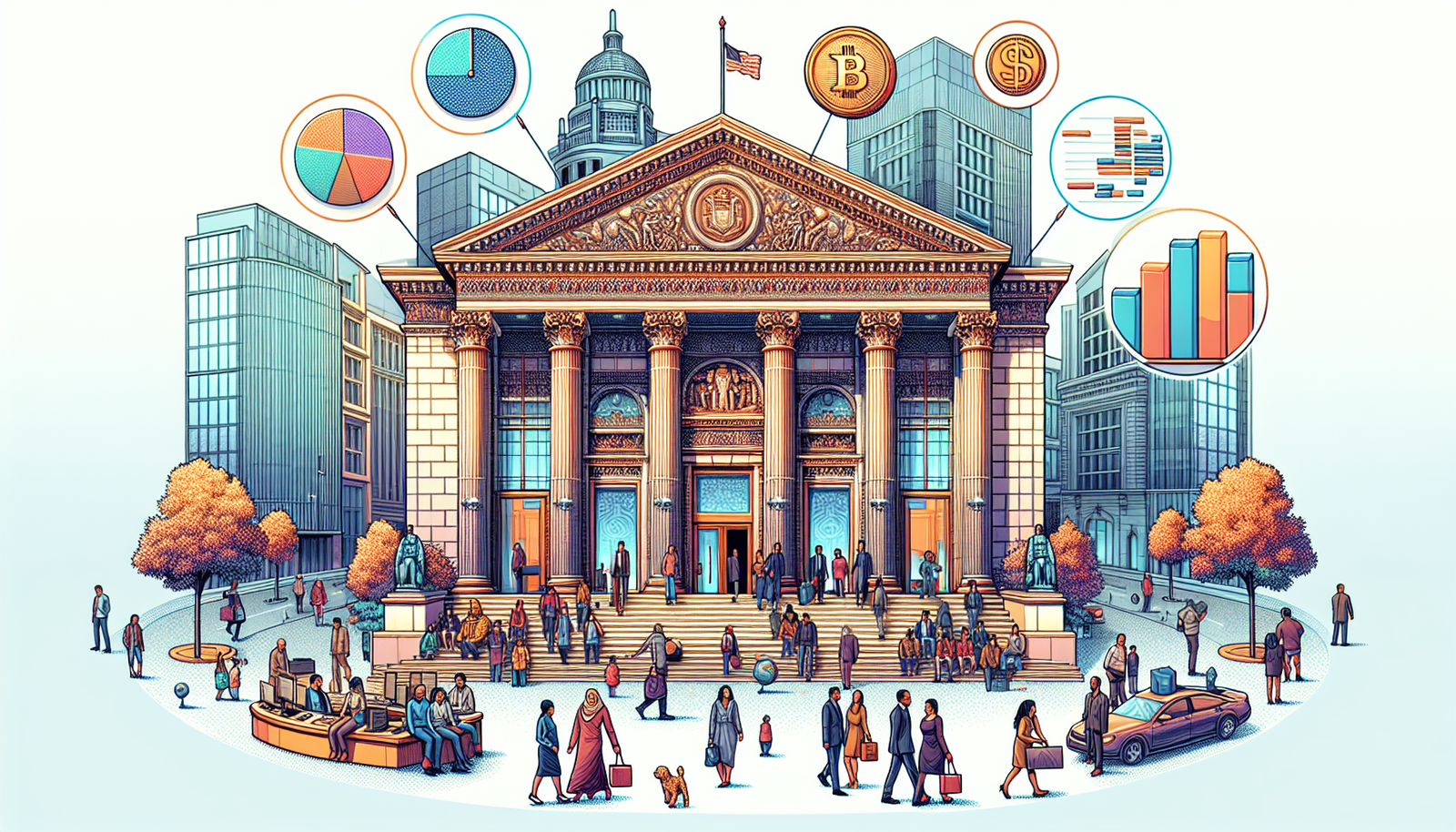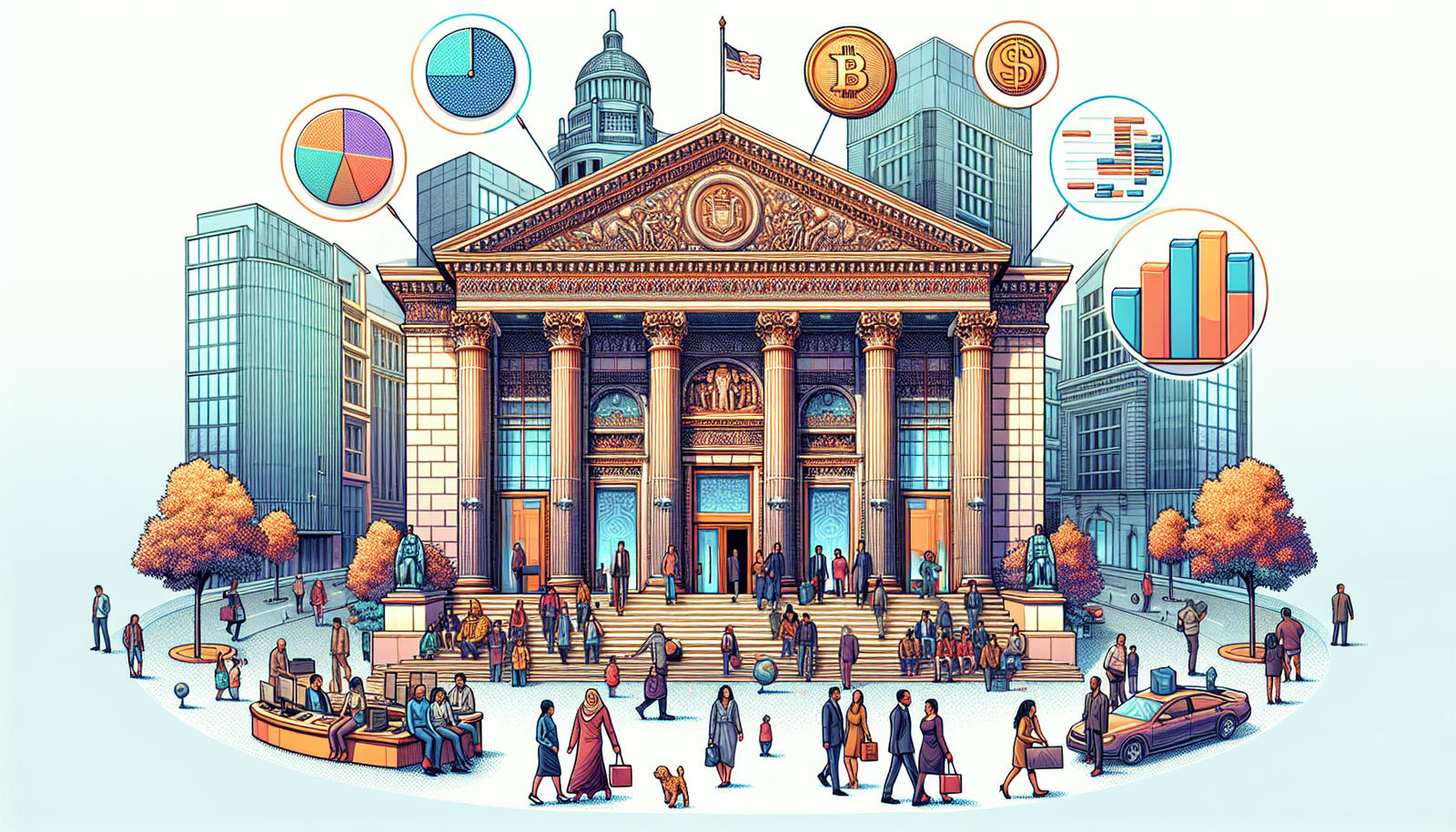
Imagine a world without banks; it’s a bit like envisaging a body without a heart. In the grand scheme of our global marketplace, banks are the life-giving epicenter, pumping the vital liquidity that feeds every stratum of the economy. “Why Are Banks Important To The Economy” is a fascinating exploration, painting a vivid picture of banks as the unsung heroes that keep our economic gears grinding smoothly. This discourse fleshes out how these financial institutions delicately act as catalysts, lubricating the wheels of economic activity thereby keeping the sprawling machinery of our global economy from experiencing catastrophic gridlock. Brace yourself to view banks from a refreshing perspective far beyond the traditional money-depositing avenue, and learn about their indispensable role, significance and influence in nurturing and galvanizing economic growth.

The Role of Banks in the Economy
In the colorful array of everyday life, banks may seem like staid, impartial entities. Yet in the grand tapestry of the economy, banks serve as vital threads, connecting individuals, businesses, governments, and even different countries. Imagining an economy without banks is akin to contemplating a sky devoid of stars—while theoretically possible, the resultant darkness is far from ideal.
Understanding the basic function of banks
Banks serve as powerful guardians of your finances. They safeguard your money, allowing you to store assets safely without fear of theft or loss. But they are more than just financial fortresses; banks are confluences where money flows in from savers and out to borrowers, creating a dynamic whirlpool of economic activity.
How banks facilitate transactions
Banks serve as your faithful intermediaries in financial transactions. Whether you’re buying a cup of coffee with your debit card or transferring money overseas, your bank acts as an efficient conduit, funneling your money into the right channels. In this process, your bank communicates with the recipient’s bank, ensuring that transactions are carried out smoothly and securely.
Banks’ role as financial intermediaries
A bank operates as a financial matchmaker, bringing together individuals and entities from disparate parts of the economy. By connecting savers, willing to lend money for a return, with borrowers, in need of funds for various purposes, banks play a critical role in distributing resources throughout the economy.
Creation of the Money Supply
Fulfilling a role that soars beyond mere intermediation, banks are actively engaged in creating new money – a process as magical as it sounds.
Banks’ role in creating money
Banks are akin to alchemists of old. But instead of trying to turn lead into gold, Banks create money from thin air. Each time a bank provides a loan, it effectively creates new money. This may sound like an arcane illusion, but it is a crucial function of banks that keeps the economy’s wheels spinning.
The concept of fractional-reserve banking
The secret behind this sorcery lies in the concept of fractional-reserve banking. Banks are required to hold only a fraction of their depositors’ money as reserves. The rest can be loaned out to borrowers. When these borrowers deposit their loan money into their bank accounts, the cycle begins anew, creating more money in the process.
Impact on the overall economy
This system stimulates economic growth by escalating the circulation of money, fueling consumer spending and investment. By accelerating the money supply, banks can have a prodigious impact on the course of the economy.
Facilitation of Capital Formation
Banks are more than just titillating money manufacturers; they also serve as industrious economic potters, molding savings into capital.
Banks as hubs for savings
Banks are integral in encouraging the habit of savings among individuals. Through attractive interest rates and security, they offer an enticing space for saving, laying the foundation for personal financial stability and economic development.
Conversion of savings into productive capital
Banks excel in the art of transformation. They take idle savings and convert them into productive capital for businesses, infrastructural projects, and various growth-enhancing activities. The savings deposited in the bank don’t merely sit there; they are actively employed in cultivating economic prosperity.
Impact on economic growth
The activation of savings into capital boosts economic growth by stimulating investments, fostering job creation, and encouraging innovation. By wheeling the economy forward, banks play a fundamental role in driving progress.

Banks and the Credit System
In their role as financial weavers, banks spin the intricate web of credit that acts as a lifeline for the economy.
How banks extend credit
Banks extend credit in various forms, from personal loans for consumers to hefty business loans for companies undertaking vast initiatives. By placing faith in borrowers’ ability to repay, banks fuel the dreams of countless individuals and entities.
Banks as a source of financial stability
The credit system, entrusted to banks, forms the backbone of financial stability. It allows for calculated risk-taking, providing a launchpad for innovative ventures that could redefine the economic landscape.
Role in facilitating economic growth
The credit system, by promoting borrowing and thereby spending, fosters economic prosperity. With credit, consumers can purchase homes, entrepreneurs can start businesses, and companies can expand, collectively driving economic expansion.
Contribution to National Development
Banks aren’t just bystanders in the journey of national development; they are keen contributors, fuelling the drive towards progress.
Banks’ role in funding public infrastructure
Banks are instrumental in financing large-scale public infrastructure projects, from airports and highways to power plants and digital networks. By extending loans to governments and private enterprises alike, banks lay the groundwork for enhanced connectivity and efficiency.
Lending support to government projects
Banks offer crucial monetary support for government initiatives, acting as major creditors. Whether it’s funding welfare schemes or investing in renewable energy projects, banks remain pivotal partners in national development.
Supporting strategic sectors
Certain sectors are vital to a country’s economic health and growth. Banks recognize this and provide special loans and banking services to strategic industries like manufacturing, agriculture, and technology, thereby bolstering their growth and impact.
Monetary Policy and Regulation
Illuminating yet another facet of their multi-dimensional role, banks stand at the crossroads of monetary policy and regulation.
Banks’ role in implementing monetary policy
Banks play a vital role in translating the theoretical notions of monetary policy—such as controlling inflation or stimulating growth—into practical reality. By adjusting interest rates or changing lending practices based on central bank directives, they breathe life into monetary policy.
Influence of central banks
Under the watchful eyes of central banks, commercial banks fulfill their obligations responsibly and ethically. Central banks often direct the commercial banks’ activities to ensure the financial sector remains healthy, robust, and capable of withstanding economic shocks.
Regulation for financial stability
Banks themselves are subject to regulation to protect customers and maintain overall financial stability. This helps to maintain trust in the banking system, prevent financial crises, and ensure sustainable economic growth.
Risk Management and Diversification
Risk is inherent in banking, but it’s expertly managed and diversified to ensure the rainfalls of fate cause as little disruption as possible.
How banks manage risk
Banks adeptly manage risk—whether credit, market, or operational—through detailed analysis, stringent policies, and astute decision-making. They assess the borrower’s capability, predict market trends, and implement preventive measures against operational failures.
Role in facilitating risk diversification
Banks also facilitate diversification, a fundamental strategy to reduce risk. By offering a wide variety of investment options, they enable individuals and businesses to diversify their portfolios, thus spreading their risk.
Impact on economic stability
This careful management and diversification of risk helps in maintaining economic stability. It prevents sudden financial shocks from spiraling into devastating crises, ensuring the economy sails smoothly, even in stormy waters.
The Role of Banks in the International Economy
In today’s globalized world, banks serve as bridges, seamlessly connecting economies across borders.
Role in cross-border transactions
Banks play a critical role in international transactions, helping businesses trade internationally with ease. Whether it’s the import of raw materials or export of finished products, banks ensure these transactions are efficient and secure.
Facilitation of international trade
Banks facilitate global commerce by providing trade finance, issuing letters of credit, and extending credit for exports and imports. As such, they are the mighty engine behind the vibrant buzz of international trade.
Impact on global financial stability
Due to the interconnected nature of global economies, the health of the banking system in one country can profoundly impact another. Thus, banks play a significant role in maintaining global financial stability, with their prudent practices reducing the risk of international financial crises.
Financial Services and Innovation
Banks are more than just custodians of money; they are eager innovators, crafting financial services that make our economic lives easier and more efficient.
Banks as providers of financial services
From current and savings accounts to personal loans and credit cards, the array of financial services banks provide is expansive and tailored to the varying needs of their customers. They also offer services like portfolio management and financial counseling, assisting customers in navigating their financial journey.
Role in financial innovation
Defined by constant innovation, banks continuously seek ways to improve services, streamline transactions, and reinforce the security of their platforms. From online banking to mobile wallets and biometric authentication, banks are in the vanguard of financial innovation.
Impact on economic growth and efficiency
Their dynamic innovations not only enrich customers’ experiences but also contribute to economic growth and efficiency. By embracing digitization and technological advancements, banks can offer seamless financial services that stimulate economic activity and promote financial inclusion.
Banks and Economic Crises
The narrative of economic crises unfailingly features banks as key protagonists, though their roles are multifaceted.
How banks can contribute to economic crises
Regrettably, banks can sometimes fuel economic crises. Engaging in risky loans, unethical practices or poor decision-making can lead to financial calamities. The 2008 global financial crisis, triggered by reckless lending in the housing market, serves as a stark reminder of this potential pitfall.
The role in responding to crises
Conversely, banks also play crucial roles in managing crises. As primary agents of monetary policy, they can lower interest rates, extend credit, and implement measures to stimulate economic recovery.
Managing economic recovery
In the aftermath of a crisis, banks have a significant role in managing and fostering economic recovery. By extending loans and adapting policies to encourage economic activity, they help to restore normalcy, proving that despite the occasional misstep, banks remain the tireless helmsmen steering the ship of economy through the tumultuous seas of change.
And so, whether you perceive them as monolithic institutions or lively economic wizards, one thing is clear: banks are indispensable in their role, stitching together the intricate fabric of our economy. For indeed, what is an economy without its banks, but a body without its beating heart?

Leave a Reply